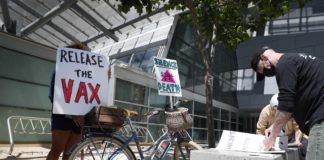
A new health care option is now available for those in Nashville’s LGBTQ community.
The Chosen Family Clinic is open in East Nashville ahead of its official launch Jan. 21. The for-profit clinic, which shares a building with sister nonprofit HIV prevention agency Music City PrEP Clinic, provides primary care geared toward the LGBTQ community. But executive director Rich MacKinnon told the Post the organization is not stopping there and has plans to expand further.
It’s been a turbulent few months for Music City PrEP. The clinic’s new location on Fatherland Street had its grand opening in September as the reimbursement policies that buoyed the nonprofit (they do not receive any grants) petered out. As organization leadership warns that PrEP offerings could be reduced due to the financial changes, MacKinnon is looking to expand into different elective offerings. Those services, including aesthetics and dental care, could help offset the cost of new LGBTQ-centered primary care services, all while Music City PrEP builds a network of physicians trained in the specific needs of people in the LGBTQ community and creating a more welcoming health care environment.
Because Music City PrEP is part of the federal 340B Drug Pricing Program, it could purchase PrEP, the HIV prevention drug, at wholesale prices. According to Kaiser Health News, clinics like Music City PrEP around the country relied on being reimbursed for wholesale purchases at retail rates to pay for ongoing operations. Gilead, the pharmaceutical company that would typically sell PrEP to the nonprofit at the wholesale price, recently changed its reimbursement practices to account for the discrepancy in an effort “to support the long-term sustainability” of its assistance program.
The move cut the nonprofit organization’s income in half, according to MacKinnon, and Music City PrEP has furloughed or laid off 10 percent of its staff. The organization is asking either for Gilead to reverse the changes or for Metro or the state to step in and help cover some of the costs.
MacKinnon worries the organization will have to cut back further, leading to additional discrepancies between funding for HIV prevention and HIV treatment. MCPC provides the HIV prevention drug to 15,000 patients. PrEP is most effective when taken every day, and patients must be tested for sexually transmitted infections every three months to receive a new prescription at Music City PrEP.
Without the same level of funding, Music City PrEP will have to find other ways to continue to stay afloat. To start, MacKinnon said the organization is working on a membership model for the adjoining Rod Bragg Rainbow Room, a community space originally modeled to be open to the public.
MacKinnon would like to see Music City PrEP and its sister organizations, starting with Chosen Family Clinic, become more like Kaiser, a hospital system that provides services for a monthly membership fee.
“For people who grew up in California, Kaiser is a big deal,” MacKinnon said. “You miss it when you go to other states and then realize you have to choose between Blue Shield, Blue Cross, UnitedHealthcare, Athena. What is all of this? Kaiser just seems to take care of it. I don’t know if this is a pipe dream, but I would like to create a ‘gay Kaiser,’ so to speak.”
MacKinnon envisions a full spectrum of services, including mental health services, dental care, vision care, Botox and cosmetic services, and dermatology. He said LGBTQ-focused health care is an untapped market, though he doesn’t see those for-profit additions as a solution for financial challenges at nonprofit Music City PrEP.
“I think our community in many ways might feel more comfortable going to these kinds of services within our community, rather than going over and being the only gay guy in an aesthetic center,” MacKinnon said. “It’s little things like that, that we’re not paying attention to. You can extend that kind of thinking to all aspects of health care and elective health care that serves our communities.”
For now, gender-affirming surgeries are not part of the plan. MacKinnon expressed concern that openly offering gender-affirming care may put a target on the organization’s back, and affect funding or invite picketers. MCPC does not market hormone therapy, but it’s offered on a case-by-case basis, he said.
“My heart is that we should be doing these things, but also I have to be very careful that we don’t endanger operations for staff and other patients who are also seeking these services,” MacKinnon said.
MacKinnon said he would like to see the organization be a go-to for health care providers wanting training in serving LGBTQ people more effectively. In early 2022, MCPC started Music City Physicians Group, a medical staffing agency that staffs both Music City PrEP and Chosen Family Clinic, and whatever other practice the organization may open.
“By making sure that the staff of the Music City Physicians Group understands the community, no matter where we put them, we can say that they’ve got our brand of sensitivity,” MacKinnon said. “This is how we’re going to grow to other practices over time.”
If Chosen Family is the first step toward the “gay Kaiser” dream, the next step is to open primary care in another city. The goal is to offset the cost of primary care offerings with more profitable elective services.
“It doesn’t matter where your heart is,” MacKinnon said. “If your pocketbook isn’t healthy, you can’t do anything.”








